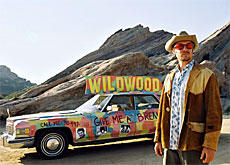
Swiss film debunks the Hollywood dream

“Promised Land” by the director Michael Beltrami is the only Swiss film entered in the international competition at the Locarno film festival.
In an interview with swissinfo, Beltrami talks about his film, the dividing line between fiction and reality, and being in the public eye.
Promised Land, which is set in present-day America, tells the story of a failed actor’s search for his identity in a Hollywood that has no place for him.
It was inspired by a person Beltrami knew.
swissinfo: Why would someone who has chosen Ticino as their adoptive home make a film about Hollywood? Aren’t there enough American films in circulation?
Michael Beltrami: Personally, I do not see much difference between making a film in Switzerland, Hungary, Japan or the United States. It just so happens that I spent five years of my life in Los Angeles, studying cinema and then working on other projects.
This is my first fiction project and it seemed natural to do it in the United States. More recently, I have made a whole series of contacts there, and because of my strong links with Los Angeles, it was a natural choice – not something forced. The idea was conceived in the United States and developed there, so it also seemed right to shoot the film there.
swissinfo: It’s a really interesting cast. As well as a number of American actors from different backgrounds, it includes Giuseppe Cederna [‘You Laugh’, ‘Mediterraneo’].
M.B.: During the pre-production phase, which lasted about three months, we took the casting very seriously. It was a fascinating experience, meeting hundreds of actors and being in a position to pick just the right people for the various roles. Giuseppe Cederna, though, was an obvious choice: he is a well-known actor and fitted the bill exactly.
swissinfo: Many young people, swept along by the current wave of reality shows like ‘MusicStar’, are convinced that becoming famous is possible for everyone. Does the film deal with this syndrome?
M.B.: Indirectly. It is concerned with the difficulties of someone who, for a short period of his life, has fame in his grasp, then for 20 years is consigned to oblivion. Meanwhile, he tries every way to make the big time once again.
It has nothing in common with reality shows. It is the story of an actor, or aspiring actor, who has the good fortune to act in a highly successful film when he is a child. Then, when he grows up, he is forgotten by public and production companies alike. He, meanwhile, remains totally set on making a comeback.
swissinfo: You say you have made a film about dreams and lost childhood. In what sense do you mean?
M.B.: The hero’s identity is bound up with his childhood as an acting prodigy, to which he returns obsessively. Unconsciously, I found myself introducing episodes linked to my own childhood and need to dream. My ambition was always to make films, so it put me in touch with my old self.
swissinfo: We are seeing more and more documentary films, generally and here in Locarno. You yourself are a documentary film-maker. Is a fiction film a way of day-dreaming, of distancing yourself from factual reality?
M.B.: I have always been fascinated by the very flexible frontier between fiction and reality. Even when making documentaries, I find myself coming up against this very fine line – ever since my first project, ‘Bella’.
What I am interested in is telling stories, and when you tell stories it is almost inevitable that you will go fishing around with the facts, creating situations that are not real, but which are somehow based on reality. Reality and imagination tend to merge.
swissinfo: Which directors have inspired you?
M.B.: My love affair with the cinema began when I was just a lad. At first it was films from eastern Europe. Then I worked as assistant to Krzyzstof Zanussi for two years and got to know Krzyzstof Kieslowski. Later, my enthusiasm was for independent American films, such as ‘Midnight Cowboy’. And I have always been devoted to Woody Allen, though maybe this feeling has diminished recently.
For me, it was a kind of therapy. When I felt depressed as an adolescent, all I had to do was go and see a film at the cinema, often one by Woody Allen, and I felt better again. The cinema has always had this therapeutic effect on me. You shut yourself away in a cinema auditorium for a couple of hours, then emerge restored, your energies mysteriously renewed by pictures and sounds experienced in a darkened room. I still am in love with the cinema.
swissinfo: You are the only Swiss contender at Switzerland’s most prestigious film festival. Do you feel a burden of responsibility?
M.B.: It is a responsibility, clearly. Because it is the only Swiss film in contention, people’s eyes are on me and my film. There are high expectations, particularly where the Locarno audience is concerned. These are people with a passion for cinema and, since my film is concerned with the world of cinema, it is good to be able to present it in this setting.
swissinfo, Raffaella Rossello in Locarno
Michael Beltrami was born in Cologne in 1962, but his adoptive home is canton Ticino, the Italian-speaking part of Switzerland.
He has previously been responsible for the “Leopards of Tomorrow” section of the Locarno film festival.
It was while he was studying film-making in Los Angeles that he met the has-been/would-be actor who inspired “Promised Land”, the only Swiss film in contention for the Golden Leopard at this year’s Locarno festival.

In compliance with the JTI standards
More: SWI swissinfo.ch certified by the Journalism Trust Initiative


























You can find an overview of ongoing debates with our journalists here . Please join us!
If you want to start a conversation about a topic raised in this article or want to report factual errors, email us at english@swissinfo.ch.